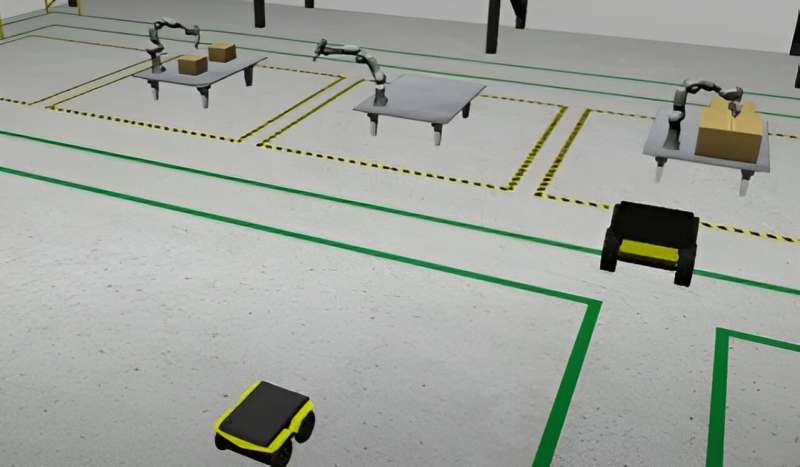
New research from the University of Massachusetts Amherst shows that programming robots to create their own teams and voluntarily wait for their teammates results in faster task completion, with the potential to improve manufacturing, agriculture and warehouse automation.
This research was recognized as a finalist for Best Paper Award on Multi-Robot Systems at the IEEE International Conference on Robotics and Automation 2024.
“There’s a long history of debate on whether we want to build a single, powerful humanoid robot that can do all the jobs, or we have a team of robots that can collaborate,” says one of the study authors, Hao Zhang, associate professor in the UMass Amherst Manning College of Information and Computer Sciences and director of the Human-Centered Robotics Lab.
In a manufacturing setting, a robot team can be less expensive because it maximizes the capability of each robot. The challenge then becomes: how do you coordinate a diverse set of robots? Some may be fixed in place, others mobile; some can lift heavy materials, while others are suited to smaller tasks.
As a solution, Zhang and his team created a learning-based approach for scheduling robots called learning for voluntary waiting and subteaming (LVWS).
“Robots have big tasks, just like humans,” says Zhang. “For example, they have a large box that cannot be carried by a single robot. The scenario will need multiple robots to collaboratively work on that.”
The other behavior is voluntary waiting. “We want the robot to be able to actively wait because, if they just choose a greedy solution to always perform smaller tasks that are immediately available, sometimes the bigger task will never be executed,” Zhang explains.
To test their LVWS approach, they gave six robots 18 tasks in a computer simulation and compared their LVWS approach to four other methods. In this computer model, there is a known, perfect solution for completing the scenario in the fastest amount of time.
The researchers ran the different models through the simulation and calculated how much worse each method was compared to this perfect solution, a measure known as suboptimality.
The comparison methods ranged from 11.8% to 23% suboptimal. The new LVWS method was 0.8% suboptimal. “So the solution is close to the best possible or theoretical solution,” says Williard Jose, an author on the paper and a doctoral student in computer science at the Human-Centered Robotics Lab.
How does making a robot wait make the whole team faster? Consider this scenario: You have three robots—two that can lift four pounds each and one that can lift 10 pounds. One of the small robots is busy with a different task and there is a seven-pound box that needs to be moved.
“Instead of that big robot performing that task, it would be more beneficial for the small robot to wait for the other small robot and then they do that big task together because that bigger robot’s resource is better suited to do a different large task,” says Jose.
If it’s possible to determine an optimal answer in the first place, why do robots even need a scheduler? “The issue with using that exact solution is to compute that it takes a really long time,” explains Jose. “With larger numbers of robots and tasks, it’s exponential. You can’t get the optimal solution in a reasonable amount of time.”
When looking at models using 100 tasks, where it is intractable to calculate an exact solution, they found that their method completed the tasks in 22 timesteps compared to 23.05 to 25.85 timesteps for the comparison models.
Zhang hopes this work will help further the progress of these teams of automated robots, particularly when the question of scale comes into play. For instance, he says that a single, humanoid robot may be a better fit in the small footprint of a single-family home, while multi-robot systems are better options for a large industry environment that requires specialized tasks.
More information:
Learning for Dynamic Subteaming and Voluntary Waiting in Heterogeneous Multi-Robot Collaborative Scheduling. hcrlab.gitlab.io/project/lvws/
Citation:
New method for orchestrating successful collaboration among robots relies on patience (2024, June 17)
retrieved 25 June 2024
from https://techxplore.com/news/2024-06-method-orchestrating-successful-collaboration-robots.html
This document is subject to copyright. Apart from any fair dealing for the purpose of private study or research, no
part may be reproduced without the written permission. The content is provided for information purposes only.




